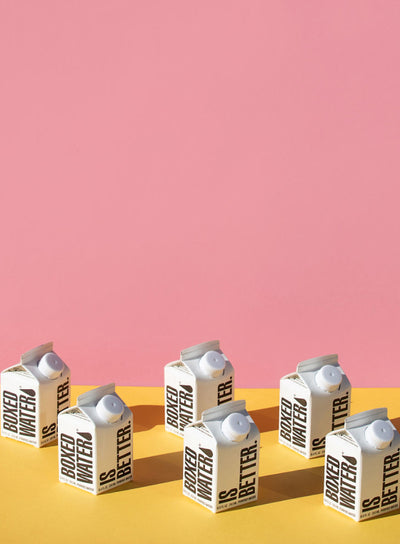The world is changing and we’re changing with it. Not that long ago, Americans smoked in restaurants, talked on flip-phones and thought vegetables were only for vegetarians. We were more interested in our external status than the status of our planet. Thankfully, as we focus on our own health and wellness, we are also thinking about the environment’s health and wellness too.
Bottled water is one of the best examples of how we can help ourselves and our planet. By strictly buying water in renewable packaging, we can help lower our carbon footprint dramatically. While refillable is always the best solution, we can safely say, importing water in plastic bottles is the worst solution. The drilling, bottling and transporting of bottled water hundreds of thousands of miles has become a multi-billion dollar industry because people saw it as a sign of luxury. We’re smarter now...
Companies like Perrier, Voss, Fiji or Evian are the best examples of waters that utilize excessive fossil fuels to ship millions of bottles of water from Europe or South Pacific islands to the USA. They marketed these remote locations indicating that their water was special. The companies fed into the myth of exclusivity by offering water at a higher price, and also garnering celebrity endorsements. In fact, there is no real benefit for the water from these locations that outweighs the environmental impact on the planet.
Global production of plastic water bottles has outpaced our recycling capabilities: 1,500 bottles are made every second. Plastic recycling has dropped in the last year to only 5%…. that means 8.9 million tons go into the landfills and oceans annually. These bottles can take up to 700 years to break down; killing fish and ocean life. What’s even more alarming is that we are learning that production and shipping have an even greater impact on our planet.
Let’s start with oil wells that drill for the plastic’s main ingredient: petroleum. As we know, petroleum pollutes, and isn’t renewable; but what you may not know, oil wells and the associated gases needed to maintain the equipment (eg. Halon 1301) contribute massively to ozone depletion, smog creation, and carbon dioxide pollution. Additionally, the associated pollution also allows more harmful UV radiation into our atmosphere increasing our exposure to skin cancer. Overall, according to a 2019 independent Life Cycle Analysis, water shipped from Europe or South Pacific islands can cause almost 250% greater damage to our environment than sustainable alternatives like carton water.
Aluminum canned water is not much different. In order to get the aluminum used for cans, Bauxite is mined and create a toxic red mud that has decimated communities. The smelting and molding of cans creates twice the carbon footprint of cartons, and while many companies tout their recyclability, the truth is that just like plastic, aluminum recycling is declining as well.
Boxed Water’s filling locations are strategically placed to allow us to serve a wide variety of locations while keeping our carbon footprint down. Location is everything. To keep up with the growing demand for Boxed Water, we carefully chose our filling locations so we can reach more areas with a minimal carbon footprint.

In the end, we can all do our part to help the planet while also living our best life. Transporting millions of bottles across the ocean, for something that is right in our back yard is crazy. More sustainable solutions are emerging every day. Look for future postings that help weigh the pros/cons of each.

